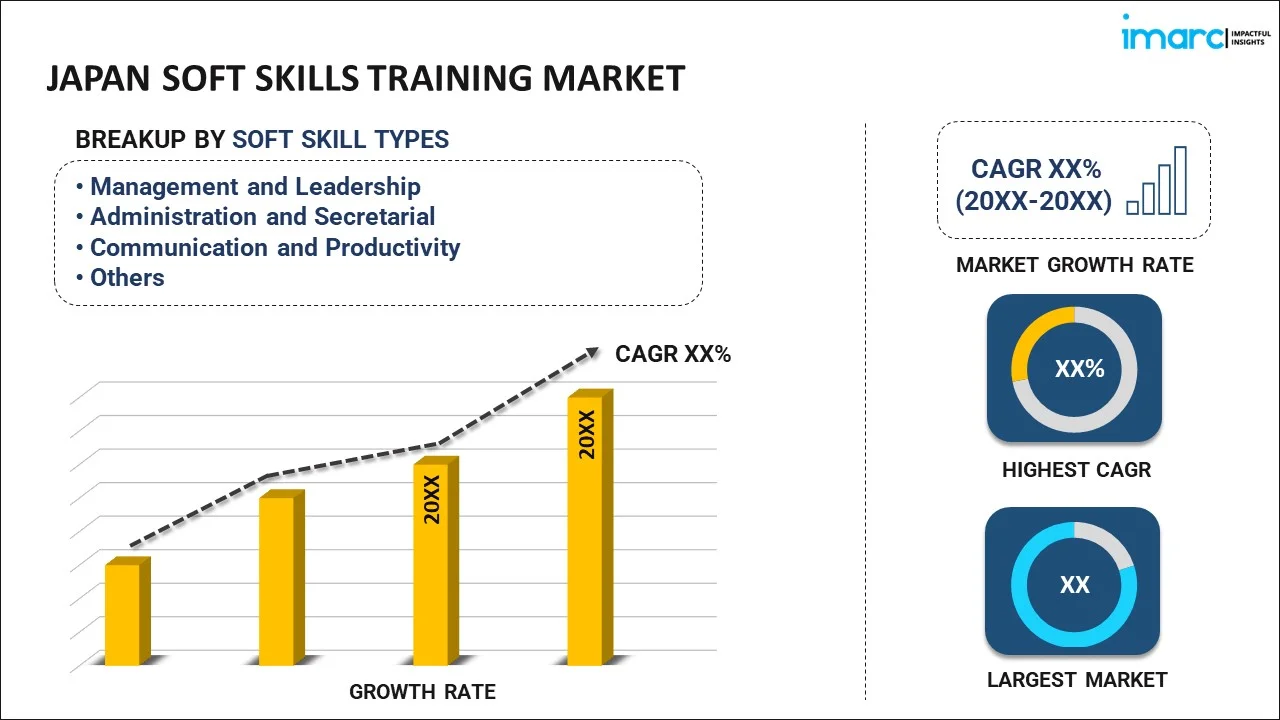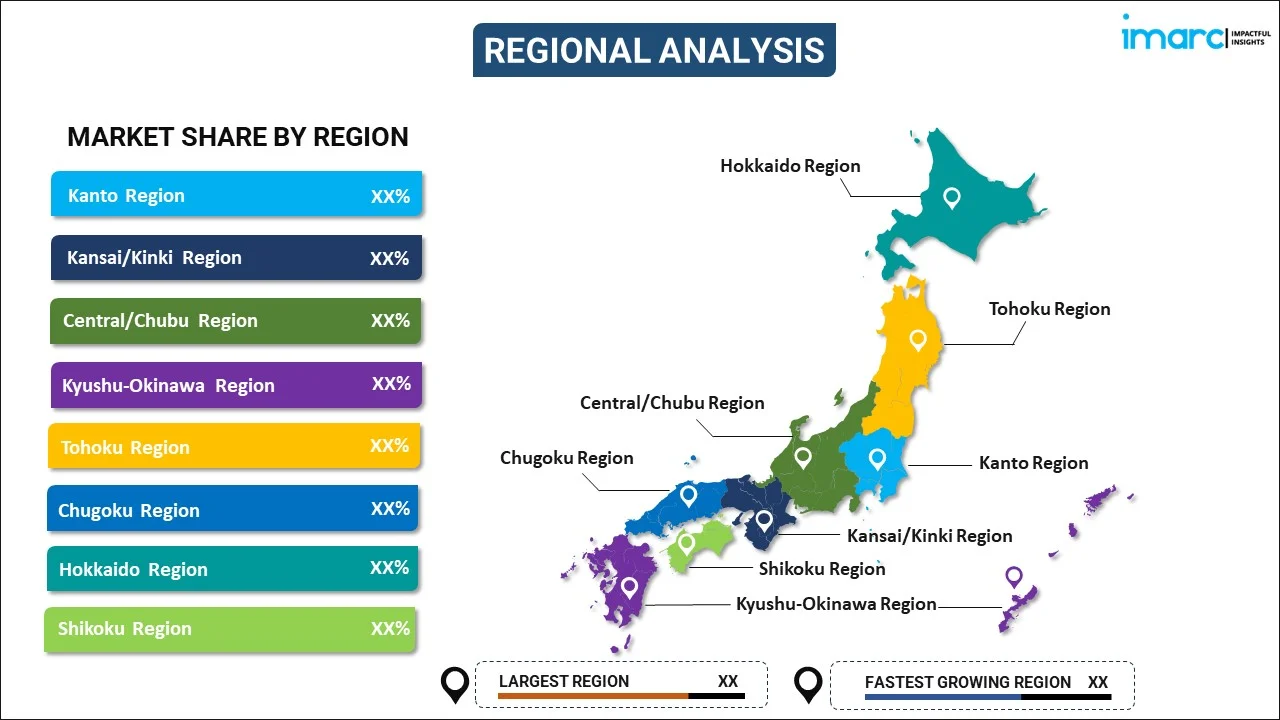
Japan Soft Skills Training Market Report by Soft Skill Type (Management and Leadership, Administration and Secretarial, Communication and Productivity, Personal Development, Teamwork, and Others), Channel Provider (Corporate/Enterprise, Academic/Education, Government), Sourcing (In-House, Outsourced), Delivery Mode (Online, Offline), End Use Industry (BFSI, Hospitality, Healthcare, Retail, Media and Entertainment, and Others), and Region 2026-2034
Market Overview:
The Japan soft skills training market size reached USD 2.2 Billion in 2025. Looking forward, IMARC Group expects the market to reach USD 5.4 Billion by 2034, exhibiting a growth rate (CAGR) of 10.55% during 2026-2034. The widespread adoption of soft skills training in the hospitality sector, the growing globalization of business operations and collaboration with several teams and clients, and the significant expansion in the education sector represent some of the key factors driving the market.
|
Report Attribute
|
Key Statistics
|
|---|---|
|
Base Year
|
2025
|
|
Forecast Years
|
2026-2034
|
|
Historical Years
|
2020-2025
|
| Market Size in 2025 | USD 2.2 Billion |
| Market Forecast in 2034 | USD 5.4 Billion |
| Market Growth Rate 2026-2034 | 10.55% |
Access the full market insights report Request Sample
Soft skills training refers to the development of a broad set of interpersonal, communication, and personal attributes that enhance an individual's effectiveness in professional and personal settings. It is often referred to as soft skills or individual skills, which complement an individual's technical or hard skills. It is recognized as essential for success in today's dynamic and interconnected world. It includes several abilities, including effective communication, teamwork, adaptability, problem-solving, creativity, emotional intelligence, time management, and leadership. It can empower individuals with the competencies needed to navigate complex social and professional landscapes. For instance, effective communication fosters clearer understanding and collaboration among team members, while emotional intelligence enhances empathy and the ability to manage interpersonal relationships with sensitivity. It also plays an essential role in leadership development, as leaders are expected to inspire, motivate, and communicate a vision effectively. Additionally, employers value soft skills in their workforce as they contribute to improved workplace relationships, higher productivity, and a positive organizational culture. It also often employs various methods, including workshops, coaching, role-playing, and simulations, to help individuals refine their interpersonal abilities. Nowadays, individuals can unlock their full potential, become more adaptable, and excel in their personal and professional lives by investing in soft skills training.
Japan Soft Skills Training Market Trends:
The Japan soft skills training market is primarily driven by the evolving workplace dynamics. In addition, the shift toward knowledge-based economies emphasized the importance of soft skills, such as communication, teamwork, and adaptability, as essential for career success, influencing market growth. Moreover, the increasing globalization of business operations and the need to collaborate with several teams and clients across borders are escalating the demand for cross-cultural communication and interpersonal skills, representing another major growth-inducing factor. Along with this, rapid digital transformation and the rise of remote work arrangements are underscoring the significance of effective virtual communication, time management, and self-motivation, propelling market growth. Additionally, Japan's growing geriatric population and the need for effective leadership and succession planning are escalating the demand for leadership and management training programs. Besides this, the growing emphasis on customer service excellence, particularly in the hospitality and service industries, is accelerating the need for training in customer-centric soft skills. Apart from this, the education sector's recognition of the importance of holistic student development is raising investments in soft skills training in schools and universities, contributing to market growth. Furthermore, the awareness of mental health and emotional well-being led to increased interest in training programs focused on emotional intelligence and stress management, further creating a positive market outlook.
Japan Soft Skills Training Market Segmentation:
IMARC Group provides an analysis of the key trends in each segment of the market, along with forecasts at the country level for 2026-2034. Our report has categorized the market based on soft skill type, channel provider, sourcing, delivery mode, and end use industry.
Soft Skill Type Insights:

To get detailed segment analysis of this market Request Sample
- Management and Leadership
- Administration and Secretarial
- Communication and Productivity
- Personal Development
- Teamwork
- Others
The report has provided a detailed breakup and analysis of the market based on the soft skill type. This includes management and leadership, administration and secretarial, communication and productivity, personal development, teamwork, and others.
Channel Provider Insights:
- Corporate/Enterprise
- Academic/Education
- Government
A detailed breakup and analysis of the market based on the channel provider have also been provided in the report. This includes corporate/enterprise, academic/education, and government.
Sourcing Insights:
- In-House
- Outsourced
The report has provided a detailed breakup and analysis of the market based on the sourcing. This includes in-house and outsourced.
Delivery Mode Insights:
- Online
- Offline
A detailed breakup and analysis of the market based on the delivery mode have also been provided in the report. This includes online and offline.
End Use Industry Insights:
- BFSI
- Hospitality
- Healthcare
- Retail
- Media and Entertainment
- Others
The report has provided a detailed breakup and analysis of the market based on the end use industry. This includes BFSI, hospitality, healthcare, retail, media and entertainment, and others.
Regional Insights:

To get detailed regional analysis of this market Request Sample
- Kanto Region
- Kansai/Kinki Region
- Central/ Chubu Region
- Kyushu-Okinawa Region
- Tohoku Region
- Chugoku Region
- Hokkaido Region
- Shikoku Region
The report has also provided a comprehensive analysis of all the major regional markets, which include Kanto Region, Kansai/Kinki Region, Central/ Chubu Region, Kyushu-Okinawa Region, Tohoku Region, Chugoku Region, Hokkaido Region, and Shikoku Region.
Competitive Landscape:
The market research report has also provided a comprehensive analysis of the competitive landscape. Competitive analysis such as market structure, key player positioning, top winning strategies, competitive dashboard, and company evaluation quadrant has been covered in the report. Also, detailed profiles of all major companies have been provided.
Japan Soft Skills Training Market Report Coverage:
| Report Features | Details |
|---|---|
| Base Year of the Analysis | 2025 |
| Historical Period | 2020-2025 |
| Forecast Period | 2026-2034 |
| Units | Billion USD |
| Scope of the Report | Exploration of Historical and Forecast Trends, Industry Catalysts and Challenges, Segment-Wise Historical and Predictive Market Assessment:
|
| Soft Skill Types Covered | Management and Leadership, Administration and Secretarial, Communication and Productivity, Personal Development, Teamwork, Others |
| Channel Providers Covered | Corporate/Enterprise, Academic/Education, Government |
| Sourcings Covered | In-House, Outsourced |
| Delivery Modes Covered | Online, Offline |
| End Use Industries Covered | BFSI, Hospitality, Healthcare, Retail, Media and Entertainment, Others |
| Regions Covered | Kanto Region, Kansai/Kinki Region, Central/ Chubu Region, Kyushu-Okinawa Region, Tohoku Region, Chugoku Region, Hokkaido Region, Shikoku Region |
| Customization Scope | 10% Free Customization |
| Post-Sale Analyst Support | 10-12 Weeks |
| Delivery Format | PDF and Excel through Email (We can also provide the editable version of the report in PPT/Word format on special request) |
Key Questions Answered in This Report:
- How has the Japan soft skills training market performed so far and how will it perform in the coming years?
- What has been the impact of COVID-19 on the Japan soft skills training market?
- What is the breakup of the Japan soft skills training market on the basis of soft skill type?
- What is the breakup of the Japan soft skills training market on the basis of channel provider?
- What is the breakup of the Japan soft skills training market on the basis of sourcing?
- What is the breakup of the Japan soft skills training market on the basis of delivery mode?
- What is the breakup of the Japan soft skills training market on the basis of end use industry?
- What are the various stages in the value chain of the Japan soft skills training market?
- What are the key driving factors and challenges in the Japan soft skills training?
- What is the structure of the Japan soft skills training market and who are the key players?
- What is the degree of competition in the Japan soft skills training market?
Key Benefits for Stakeholders:
- IMARC’s industry report offers a comprehensive quantitative analysis of various market segments, historical and current market trends, market forecasts, and dynamics of the Japan soft skills training market from 2020-2034.
- The research report provides the latest information on the market drivers, challenges, and opportunities in the Japan soft skills training market.
- Porter's five forces analysis assist stakeholders in assessing the impact of new entrants, competitive rivalry, supplier power, buyer power, and the threat of substitution. It helps stakeholders to analyze the level of competition within the Japan soft skills training industry and its attractiveness.
- Competitive landscape allows stakeholders to understand their competitive environment and provides an insight into the current positions of key players in the market.
Need more help?
- Speak to our experienced analysts for insights on the current market scenarios.
- Include additional segments and countries to customize the report as per your requirement.
- Gain an unparalleled competitive advantage in your domain by understanding how to utilize the report and positively impacting your operations and revenue.
- For further assistance, please connect with our analysts.
 Request Customization
Request Customization
 Speak to an Analyst
Speak to an Analyst
 Request Brochure
Request Brochure
 Inquire Before Buying
Inquire Before Buying




.webp)




.webp)












